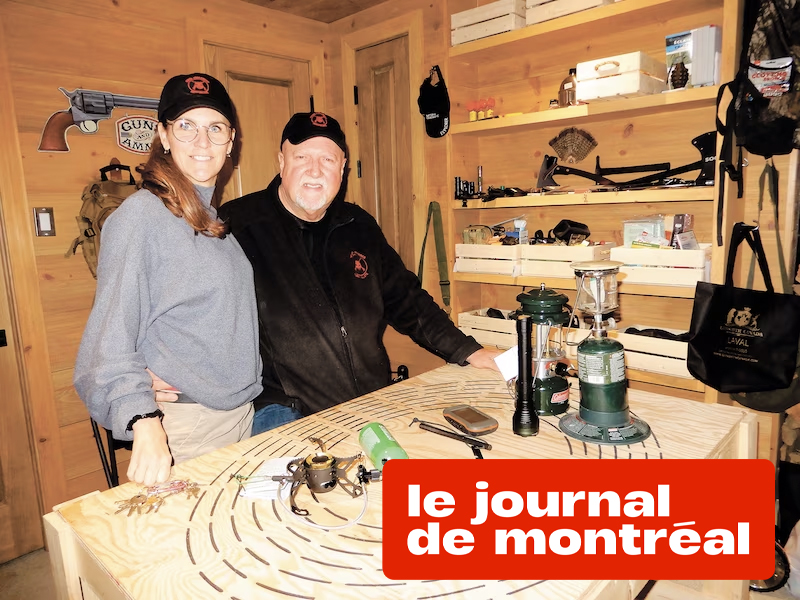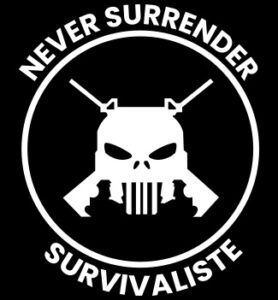
Quebec survivalists believe that the population should be self-sufficient for a few days in case of an outage.
Too many Quebecers are not prepared to cope with a power outage lasting several days, lament survival experts, discouraged that citizens were caught unprepared during last week's outages.
"Our quality of life [the electrical grid] hangs by a thread. A good gust of wind and everything will fall [...] If there's an electrical breakdown, do you want to find yourself at the Olympic Stadium with 150,000 people? I don't," states Benoît, a survivalist who considers himself one of the best prepared in Quebec.
He withholds his last name because, according to him, his property in the Laurentians would attract envy in the event of a disaster. With a 30,000-watt generator, vegetable garden, chickens, rabbits, medications, immense food reserves, and firearms, he lacks nothing to survive for months.
Quality of Life
For him, it's an "insurance for quality of life" since he is convinced that a major event will occur one day.
"Equipping yourself to the extreme is expensive," he acknowledges, "but basic equipment is a modest cost. It prevents chaos," he summarizes, believing that the recent power outages will have "awakened" more than one resident.
"I saw distress in the eyes [of disaster victims]," says the businessman in the renovation industry.
Too few people are truly prepared, according to him. "They think they are because they have a generator, for example, but they don't have enough gasoline, no water reserve, not much food or cash," he lists.
"I find it absurd that the average citizen is not prepared, does not have the necessary equipment to deal with a power outage," says Mathieu Montaroux, a Montrealer who founded Québec Preppers, a website offering survival advice in urban environments.
He believes that too many people rely on government or military assistance, whether it's for a power outage, a flood, or a forest fire. "It's the citizen's responsibility," says Éric Lemay in turn, who founded the company Plan B solutions, specializing in prevention and security. If people take charge of their own preparedness, he believes, authorities will be able to "focus on those who really need it," such as vulnerable seniors.
"People should recognize that electricity can stop. Everyone is vulnerable," adds Mathieu Hébert, founder of the survival school Les Primitifs.
Not So Difficult
This week, Christophe Éthier in Boisbriand spent 54 hours without electricity.
"Honestly, it wasn't difficult," he says.
He and his partner limited themselves to the kitchen and bedroom. They burned candles for warmth and used a small propane camping stove for cooking, positioned near the carbon monoxide detector.
"You can't prepare for everything," concludes Éric Lemay, but he believes that Quebecers should be able to "soften the blow."
Cash
No survival kit is complete without cash, experts say. Without electricity, credit and debit cards become useless. Éric Lemay from Plan B solutions suggests having at least $300 on hand. "Enough for a full tank of gas and groceries," he says.
Ready for anything, the survivalist Benoît believes that having a sum of $1000 set aside is safer.
Fondue Stove
Generators or camping stoves can be very handy during a power outage. However, a family caught unprepared could turn to their fondue stove, suggests Mathieu Hébert from the Les Primitifs school.
Fondue fuels are already approved for indoor use and can be helpful in a pinch, he points out.
Above all, it's important to have a plan, he says.
Try it with the family
Why not try living without electricity for 24 to 48 hours to see what we need, suggests Mathieu Hébert from the survival school Les Primitifs.
"Try it when you're not stressed and you can turn the lights back on at any time," he emphasizes, seeing it as the ideal way to understand what a family needs to survive and to identify vulnerabilities.
It's also possible to see which foods the children prefer.
YOUR KIT SHOULD CONTAIN…
These first seven items
They will allow you to get by during the first three days of an emergency situation, according to Public Safety.
♦ Battery-powered radio (with spare batteries)
♦ Drinking water (two liters per person per day)
♦ First aid kit (antiseptics, pain relievers, adhesive bandages, sterile gauze pads, scissors, etc.)
♦ Lighter or matches and candles
♦ Manual can opener
♦ Headlamp or flashlight (with spare batteries or a hand-cranked model)
♦ Non-perishable food for that duration
Additional items that can also be included are:
- Dust masks to filter contaminated air
- GPS
- Compass
- Sunglasses and sunscreen
- Pocket knife
- Small tool box
- Backpack
- Tent, sleeping bag, sleeping mat
- Stove, fuel, and cooking utensils
- Toiletries
- Over-the-counter medications (antihistamine, ibuprofen, acetaminophen, etc.)
- Prescription medications (prescribed by your doctor)
- Garbage bags
- Hiking boots
- Waterproof clothing
- Spare clothes
- Card games, books, magazines
**All translations are made from the original article written in French.
